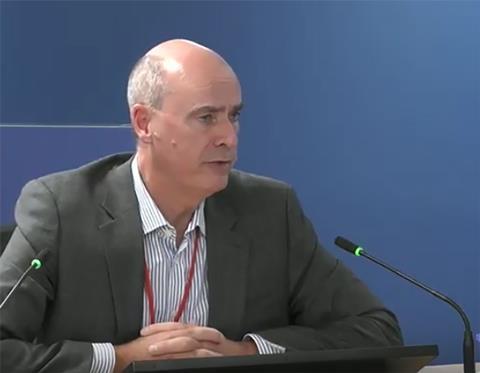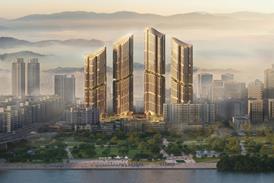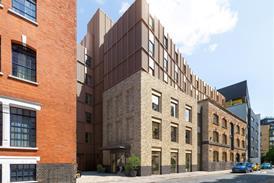TMO director cannot tell inquiry why he did not ask ‘obvious question’
A senior client on the Grenfell Tower refurbishment project admitted he never asked Studio E if it had experience of cladding a high-rise residential building before he recommended the architect’s appointment.
Mark Anderson of Kensington & Chelsea Tenant Management Organisation (TMO) was unable to tell the Grenfell Inquiry yesterday why he had not asked the question despite the inquiry barrister describing it as “obvious”. The inquiry also heard the question was raised by a resident.
Inquiry barrister Andrew Kinnier asked Anderson: “Why not? It’s an obvious question, isn’t it?”

Anderson, who was the TMO’s interim director of assets between 2011 and January 2013, responded: “It is now. I don’t know why I didn’t ask that question.”
Kinnier responded: “With respect, Mr Anderson, it was an obvious question then: Have you been involved in cladding a high-rise residential building? That’s what you were asking them to do.”
Anderson replied that at that stage the type of cladding – render or rainscreen – had not been decided. He said he did ascertain the practice had experience of complicated cladding projects and that individual architects working there had experience of residential refurbishment.
He said he had at least two meetings with Studio E director Andrzej Kuszell and reviewed RBKC’s procurement documents for the neighbouring Kensington Academy and Leisure Centre (KALC) project, which was designed by Studio E, before making his recommendation.
He also asked his team to research Studio E and all the consultants working on KALC to establish their professional standing, client base and competence.
Inquiry chairman Michael Moore-Bick interrupted the cross-examination to suggest the first step should have been to consider whether they wanted Studio E.
Anderson said: “There was nothing to indicate we wouldn’t want to use them. There was a process I went through to satisfy myself that the pre-construction professional team were suited to a project of that nature.”
Kinnier spent much of the day asking about the procurement of the Grenfell project and whether it was Ojeu-compliant because, for speed, the plan was to rely on the Ojeu process RBKC had undertaken for KALC in summer 2011 which Anderson described as “rigorous”.
Asked whether the KALC Ojeu notice had mentioned Grenfell, Anderson - who qualified as an architect, gaining his part III and working in private practice in the early 1990s - said not specifically, but that it had referenced housing regeneration.
He said RBKC’s legal and procurement specialists initially advised him that relying on the prior procurement process to appoint the Grenfell consultant team would be OK – but that that advice had changed twice, prompting Anderson to introduce a limit for fee bids to keep them below the £174,000 Ojeu threshold. During his evidence in March, Kuszell admitted Studio E would probably not have been appointed if there had been a competitive process owing to its lack of experience.
The inquiry heard yesterday that residents of the Lancaster West Estate were unhappy with the academy and leisure centre project planned for the bottom of Grenfell Tower and so the improvements to the estate were intended to repair relations.
RBKC wanted to run the projects in parallel – which would require Grenfell to catch up with KALC – to achieve efficiencies, Anderson confirmed. These efficiencies included cost and programme. Anderson said in his witness statement that using the same consultant team would save up to nine months.
He said of this joint procurement process: “RBKC never said ‘you must do it’ but there was a very strong message that that was their desire.”
Kinnier asked him: “What came first, Mr Anderson, was it the pragmatic benefits of using Studio E because of their connection with KALC, or looking at their qualifications, expertise and experience?”
“I think it was a combination of both,” he replied.
‘Not look bad next to KALC’
The inquiry was shown a confidential internal report on the Grenfell project from January 2012 which said that because KALC would have a significant effect on the residents of neighbouring Lancaster West the council wanted to fund a “legacy project” on the estate and was “desirous that [it] be reflective of the design proposals for KALC, benefit residents of the estate and is delivered efficiently”.
Kinnier asked Anderson if “reflective of the design proposals” meant “look good next to KALC? Or to put it another way, not look bad next to KALC?”
Anderson said that was not his recollection of the conversations preceding the report. Rather these were concerned with modernising Grenfell Tower, improving its thermal efficiency and upgrading the flats, he said.
Kinnier went on: “Delivered efficiently. Does that mean for the lowest possible cost?” Anderson replied: “That’s not my understanding.”
Anderson said his definition of efficient was about “getting maximum output for your available budget”. He conceded cost played a part but said it wasn’t “necessarily the prime driver”.
The inquiry continues.
















No comments yet